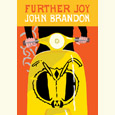Addressing the Impossible
Joy Williams’s stories skewer the absurdity of our wretched world
In his recent New York Times review of The Visiting Privilege, a new story collection from Joy Williams, Ben Lerner cites a bit of criticism by Williams herself regarding Denis Johnson’s The Laughing Monsters: “Life is ludicrous and full of cruel and selfish distractions. Honor is elusive and many find the copious ingestion of drugs necessary. Our ignorance is infinite and our sorrows fearful. We have made an unutterable waste of this world, and our passage through it is bitter and unheroic. Still, the horror can at times be illuminating, and it is necessary that the impossible be addressed.”
 Johnson’s novel has to go all the way to Congo—Conrad’s fabled heart of darkness—to reveal the horror. Far more terrifyingly, Joy Williams finds it right here in the good ol’ USA, in a host of hardscrabble locales from sun-blasted Arizona to fetid Florida, and in the interior lives of ignoble characters we can’t despise because they are so obviously, undeniably us.
Johnson’s novel has to go all the way to Congo—Conrad’s fabled heart of darkness—to reveal the horror. Far more terrifyingly, Joy Williams finds it right here in the good ol’ USA, in a host of hardscrabble locales from sun-blasted Arizona to fetid Florida, and in the interior lives of ignoble characters we can’t despise because they are so obviously, undeniably us.
The Visiting Privilege kicks off with “Taking Care,” the title story of Williams’s first collection, published in 1982, in which an aging preacher must watch his wife die from leukemia and simultaneously care for his wayward daughter’s infant child. “He has been preaching for thirty-four years,” Williams writes. “He is gaunt with belief. But his wife has a red cell count of only 2.3 million. It is not enough! She is not getting enough oxygen! Jones is giving his sermon. Somewhere he has lost what he was looking for. He must have known once, surely.” The becalmed angst of this patient, tender man sets the tone for what follows. “We are saved not because we are worthy,” Jones says. “We are saved because we are loved.”
But love in a Joy Williams story is much less a balm for suffering than a guarantee of it. In “The Mother Cell,” for instance, the mothers of convicted murderers find themselves almost magically drawn to the same small community, where they form a bizarre bond. “These things happen, like when highly allergic people, practically allergic to life itself, all gravitate to some mountain in Arizona, or when a bayside town in Maine becomes the locus for lipstick lesbians overnight.” The humor here is wicked; the context unrelentingly cruel and tragic. “We cannot make amends for the sins of our children,” the eldest mother laments. “We gave birth to mayhem and therefore history. Oh, ladies, oh, my friends, we have resolved nothing and the earth is no more beautiful.”
Williams’s language is plain and unadorned but also somehow piercing and revelatory. Her characters’ feelings range from gentleness and compassion to lunacy and viciousness. Her situations are typical—almost banal—yet endowed with an air of mystery and the supernatural. In “The Country,” an unnamed narrator describes what appears to be a typical middle-class wife and son. Gradually, however, it becomes clear that the boy—Colson—has the ability to channel the voices of the dead:
Colson does not bring them back to perform feats of omniscience or magicians’ tricks. I don’t know why he brings them back. I tried to prevent him at first. I appealed to his reasonableness, though in truth he is not particularly reasonable. I threatened him with psychiatric counseling, hours of irrelevant questions and quizzes. I told him his performances were futile and cruel. I teased him and even insulted him, saying that if he considered himself gifted or precocious he was sadly mistaken. Nothing availed.
Colson’s “gift,” it seems, is a source of torment to his father. Indeed, many of Williams’s children are a scourge to their parents, from the vicious harpies of “The Girls” to “Brass,” in which a troubled man describing his dysfunctional family gradually reveals himself to be the father of Jared Loughner, the the mass murderer who shot Congresswoman Gabrielle Giffords. For Williams, even love for a child is a perennial reminder of the world’s frailty.
Does it seem strange to suggest that such grim and hopeless matter, in Joy Williams’ hands, can also be frequently uproariously funny? Perhaps this is the core of her genius; the reason she has become a figure of such fascination among the literati. Williams is the quintessential “writer’s writer,” maybe because only writers completely comprehend (or care) how incredibly difficult a task it is to convey a one honest emotion, much less the spectrum of mirth, tenderness, cruelty, bitterness and pity that Williams can sometimes pack into a single page. Williams is most frequently compared with Flannery O’Connor, but it might be more appropriate to compare her to Kafka, using her otherworldly powers to skewer the absurdity of our wretched world, or to the Melville of “Bartleby,” forcing us with the strength of her gift to stare into the abyss. “Happiness courts the light, so we deem the world is gay,” Melville writes, “but misery hides aloof, so we deem that misery there is none.” Joy Williams’s stories show us what hides aloof, with quiet grace, searing honesty, and merciless wit. Ah, Joy! Ah, humanity!

Ed Tarkington holds a B.A. from Furman University, an M.A. from the University of Virginia, and a Ph.D. from the creative-writing program at Florida State University. His debut novel, Only Love Can Break Your Heart, will be published by Algonquin Books in January 2016. He lives in Nashville.


